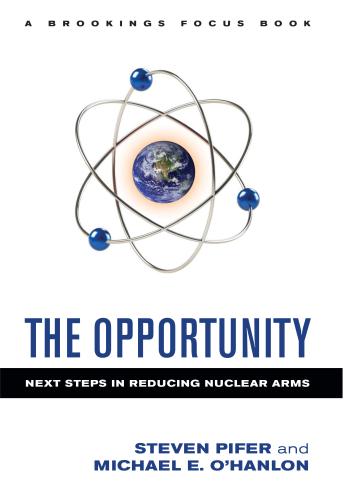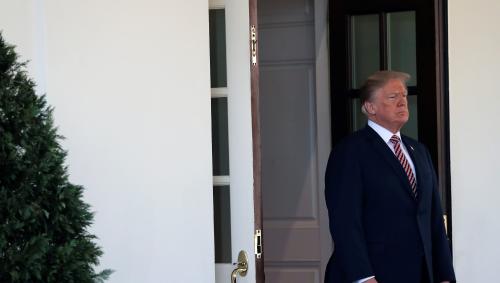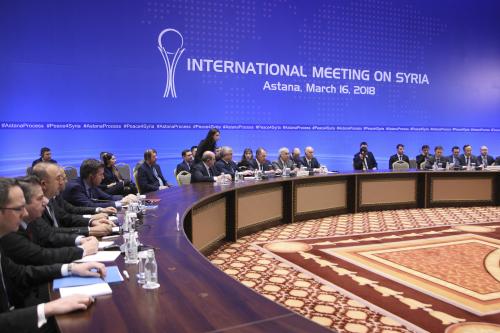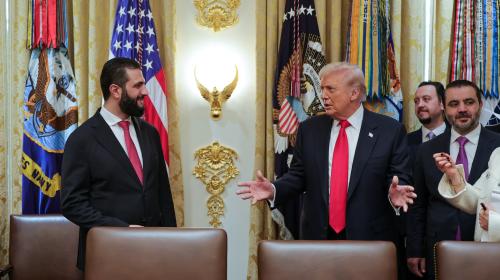President Donald Trump’s early morning tweets foreshadowing a U.S. airstrike on Syria quickly prompted the Twitterati to raise questions about U.S. strategy in Syria. The whiplash is palpable: Trump announced last week that he was seeking to remove U.S. troops from Syria as soon as possible; today, it’s: “Get ready, Russia, because they [missiles] will be coming.”
This would be a major escalation in American use of force in Syria. While many cheered Trump’s strike last April in response to a chemical attack in Khan Shaykhun (including some Democrats, who had been disappointed by President Obama’s failure to enforce a red line in August 2013), this one-off action was not part of a coherent strategy. Clearly—and tragically— it also failed to deter the Assad regime from using chemical weapons again, given the attacks last weekend in Douma. So what would be different this time? Here are some questions to consider in the coming hours and days, as the Trump administration plans its response.
What is the aim of the strikes? Are these purely punitive strikes, taken to make the international community feel better about retaliating for the brutal death of children (leaving aside those killed over the last seven years by bombs and guns, as well as other unanswered chemical weapons attacks)? Will they be large enough to deter further chemical weapons use by the regime? Or will they be extended strikes that serve the broader purpose of undermining the regime’s military capabilities?
What is the legal basis for these strikes? The administration will need to put forward a legal basis for military action. Last year, Trump cited his constitutional authority as commander-in-chief as the domestic legal rationale. However, questions remained about international legal authority—particularly without backing by the United Nations or claims of self-defense. The U.S. government has not generally supported arguments by human rights advocates for humanitarian interventions.
What if Russia does shoot down U.S. missiles? Although Trump’s tweet was characterized by typically bellicose rhetoric, it raises serious questions of how the United States will react if Russia does in fact seek to intercept its missiles. Syria is a crowded and dangerous battlespace, as multiple actors jockey for power. The war has already witnessed the Turkish downing of a Russian jet that violated its airspace in November 2015, while Turkey’s ongoing Operation Olive Branch in Afrin has raised the prospect of fighting between U.S.- and Turkish-backed forces. Impending missile strikes will undoubtedly heighten tension between the United States and Russia.
Why is Trump foreshadowing his military action? Trump was critical of Obama for signaling his intention to strike the Syrian regime after its 2013 use of chemical weapons. And yet in recent days, he stated publicly his desire to withdraw the U.S. military from Syria (followed soon after by the chemical weapons attack), then touted his plans for “nice and new and ‘smart’” bombs. More disturbing is the cavalier way in which the president is describing military action, a serious undertaking with human consequences.
Will European allies join the U.S. in military action? President Trump has been working the phones in recent days, with calls to French President Emmanuel Macron and British Prime Minister Theresa May. Macron has been increasingly bullish in his approach to Syria, including with recent efforts to help resolve the conflict in northwestern Syria between Turkey and a faction of Syrian Kurdish forces (the YPG). Following the recent chemical weapons attack, he agreed with Trump on the need for a “strong, joint response.” France was the only major European ally that supported Obama’s initial intention to conduct strikes in 2013. May has condemned the Assad regime’s recent attack, but been more cautious in discussing repercussions, citing the need for more evidence; with Brexit dominating domestic and parliamentary politics, she is undoubtedly mindful of her predecessor’s failure to secure parliament’s support for joint action with the United States in 2013.
Finally, what is broader U.S. strategy in Syria? The Trump administration has been increasingly contradictory in its articulation of Syria objectives. Former Secretary of State Rex Tillerson expanded the mission to include countering Iranian influence; CENTCOM Commander General Joseph Votel remains focused on the Islamic State and continued cooperation with YPG fighters (to Turkey’s dismay); and Trump has expressed his desire to remove American troops as soon as possible. (Criticism was also leveled against the Obama administration for lacking a clear Syria strategy beyond the defeat of the Islamic State.) The Trump administration has yet to articulate a coherent policy on Syria, let alone a sense of how military strikes contribute to its achievement.
The Brookings Institution is committed to quality, independence, and impact.
We are supported by a diverse array of funders. In line with our values and policies, each Brookings publication represents the sole views of its author(s).










![Photo showing "I [heart] Syria" sign along the road in Syria](https://www.brookings.edu/wp-content/uploads/2025/11/I-heart-syria-photo.jpg?quality=75&w=500)
Commentary
Trump’s Syria whiplash
April 11, 2018